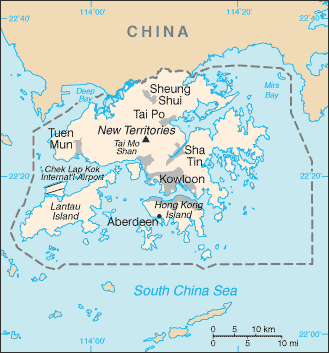
Update 12/07/20: The "Hong Kong People's Freedom and Choice Act of 2020" (H.R.8428) passed by voice vote in the House of Representatives and will move onto the Senate.
This week, the House of Representatives is set to consider H.R. 8428, the "Hong Kong People's Freedom and Choice Act of 2020", sponsored by Rep. Tom Malinowski (D-N.J.).
The bill is a reaction to the heavy-handedness exhibited by the People's Republic of China (PRC) over the last several months, after enacting a Hong Kong National Security Act that contravenes the conditions under which the PRC regained control of Hong Kong from Great Britain. The National Security Act was designed to repress the traditionally democratic and representative legislature of Hong Kong and ensure seating of only those legislators sympathetic to PRC goals and policies. Many pro-democracy demonstrators have been arrested and charged; some have disappeared.
H.R. 8428 would grant Temporary Protected Status (TPS) to:
- Any long-time resident of the Hong Kong Special Administrative Area who "holds no right to citizenship in any country or jurisdiction other than" the PRC, Hong Kong, or Macau;
- Plus their spouses;
- And any unmarried children up to the age of 27.
The bill has a variety of problems. In a July blog post, I discussed many reasons why permitting wholesale immigration of Hong Kong residents was inherently flawed and would represent a national security risk to the United States — not least among them being that we cannot presume that all Hong Kong residents are anti-PRC, pro-democracy advocates. That the Chinese Communist Party would use a bill like Malinowski's to insert its own spies and agents of influence into the American Chinese community is beyond question.
As if to reinforce this point, a few weeks after my blog post on Hong Kong, the FBI announced the arrest of Alexander Yuk Ching Ma, a native of Hong Kong who immigrated to the U.S. and naturalized, then infiltrated the CIA and later worked for the FBI, all while spying for the PRC. Informed observers commenting on the blog I wrote about Ma noted that the mysterious unindicted co-conspirator in the case was likely his brother (also a double agent who worked for the CIA until cashiered for alien smuggling).
Another point to consider regarding H.R. 8428: Many people mistakenly believe that "Hong Kong" consists only of one small but relatively crowded island by that name that hangs off the underbelly of China proper. In fact, the Hong Kong Special Administrative Region (SAR) consists of multiple islands and even a chunk of the mainland itself, comprising approximately 1,108 square kilometers and a population of 7.5 million. When you include citizens of the politically and geographically separate Macau SAR (a former Portuguese, not British, colony) into the mix, as this bill does, you've potentially added a substantial portion of roughly 650,000 more individuals — an eye-popping possible 8.15 million persons who might be eligible for benefits under this bill. Even if we were to halve that figure, it's staggering.
No doubt advocates for this bill will insist that it doesn't authorize permanent immigration, but "only" TPS. That, of course, is a canard. The whole history of how TPS has been administered shows us that, as Mark Krikorian has noted, there's nothing so permanent as temporary status. Hundreds of thousands of alien recipients of TPS from various countries have now been here for decades, and mounted innumerable legal battles to be allowed to remain in perpetuity and granted amnesty. TPS is by any measure a failed legal mechanism that has simply added to the collective burden of unrestrained immigration to the United States, including by individuals who entered illegally and otherwise would have no footing to stay.
Finally, when considering the bill, it's worth looking at the TPS statute itself, 8 U.S.C. Sec. 1254A, which speaks consistently of granting of TPS only in circumstances that reflect a temporary condition. Take for instance, Subsection (b)(1)(C):
(b) In general
The Attorney General, after consultation with appropriate agencies of the Government, may designate any foreign state (or any part of such foreign state) under this subsection only if—
...
(C) the Attorney General finds that there exist extraordinary and temporary conditions in the foreign state that prevent aliens who are nationals of the state from returning to the state in safety, unless the Attorney General finds that permitting the aliens to remain temporarily in the United States is contrary to the national interest of the United States. [Emphasis added.]
While it's clear that Congress need not bind itself to the rules it established for the attorney general (now the Secretary of Homeland Security), the cogent question is this:
Can anyone in Congress — or indeed anywhere — say with a straight face that the steps the PRC has taken in Hong Kong represent a temporary condition? What are the chances that the Chinese Communist Party will change its mind, unbend, and return Hong Kong's legislature and government to the status quo ante?
Considered in that light, it's abundantly clear that the TPS designation used by Rep. Malinowski is a fig leaf to grant hundreds of thousands, perhaps millions, of Hong Kong residents (who may in fact be PRC citizens) permanent entry into the United States. But were he honest about it, it's likely the bill would fail.
The bill is a potential national security disaster in the making for our country, and if it passes, the intelligence organs of the PRC and its People's Liberation Army will be delighted at the opportunities it spawns.
A legal mechanism already exists in the law for Hong Kong residents who are at risk of persecution: They may seek to enter as refugees.
